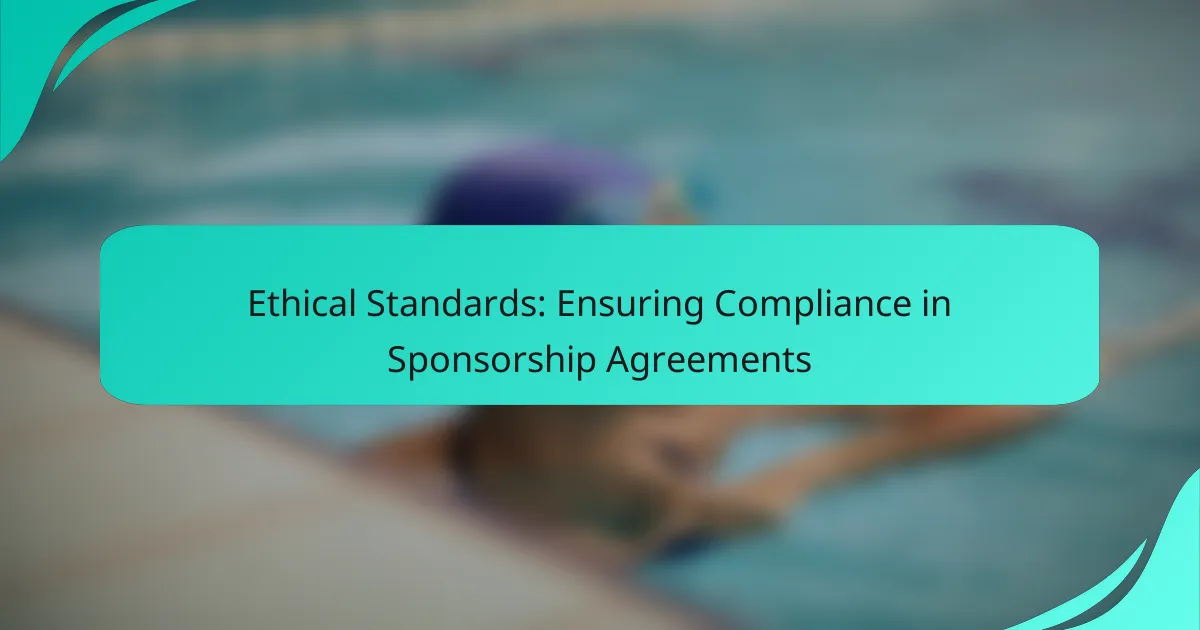Ethical standards in sponsorship agreements are crucial for maintaining integrity and fairness among all parties involved. By emphasizing transparency and compliance with legal regulations, organizations can foster trust and accountability, while structured processes and regular audits help ensure adherence to these standards. Understanding the potential repercussions of non-compliance further underscores the importance of aligning sponsorship activities with ethical guidelines.
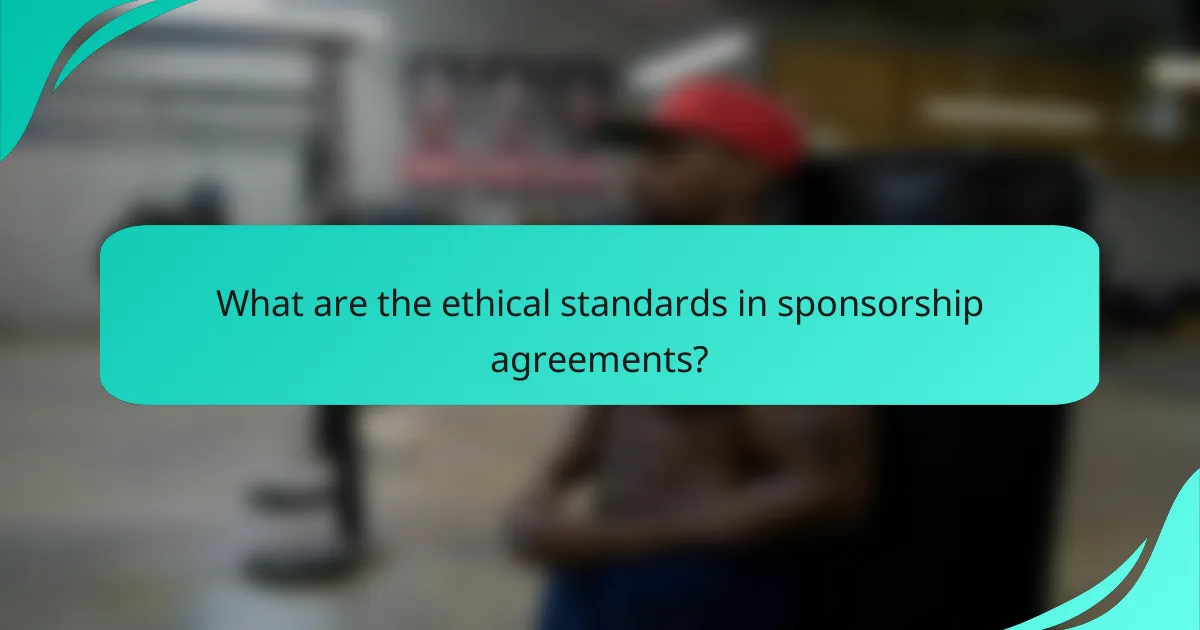
What are the ethical standards in sponsorship agreements?
Ethical standards in sponsorship agreements ensure that all parties act with integrity and fairness. These standards typically focus on transparency, fair representation, and compliance with legal regulations to foster trust and accountability.
Transparency in financial disclosures
Transparency in financial disclosures is crucial for maintaining trust between sponsors and sponsored entities. Both parties should clearly outline the financial terms, including the total amount of sponsorship, payment schedules, and any additional costs that may arise. This openness helps prevent misunderstandings and ensures that all parties are on the same page.
For example, a sponsorship agreement might specify that a company will provide $50,000 in funding, with 50% due upfront and the remainder upon completion of specific milestones. Clear documentation of these terms is essential.
Fair representation of all parties
Fair representation in sponsorship agreements means that all parties involved should be accurately portrayed and their contributions recognized. This includes ensuring that the sponsor’s brand is represented in a way that aligns with their values and that the sponsored party receives appropriate credit for their role.
For instance, if a non-profit organization receives sponsorship from a corporation, the agreement should stipulate how the corporation’s logo will be displayed and the context in which it will be associated. This prevents any misrepresentation that could damage reputations.
Compliance with legal regulations
Compliance with legal regulations is a fundamental aspect of ethical sponsorship agreements. Both sponsors and sponsored entities must adhere to relevant laws, including advertising standards, tax regulations, and any industry-specific guidelines. Failure to comply can lead to legal repercussions and damage to reputations.
For example, in the United States, sponsorship agreements must comply with the Federal Trade Commission (FTC) guidelines regarding endorsements and testimonials. This includes clearly disclosing any financial relationships in promotional materials to avoid misleading consumers.

How can organizations ensure compliance?
Organizations can ensure compliance in sponsorship agreements by implementing structured processes that include regular audits and comprehensive training for staff. These measures help maintain ethical standards and align sponsorship activities with legal and organizational guidelines.
Regular audits of sponsorship agreements
Conducting regular audits of sponsorship agreements is crucial for ensuring compliance. These audits should assess whether the terms of the agreements are being met and if they align with ethical standards and legal requirements. Organizations can schedule audits annually or bi-annually, depending on the volume and complexity of their sponsorships.
During audits, organizations should review documentation, financial transactions, and communications related to sponsorships. This helps identify any discrepancies or potential ethical concerns early on. A checklist can be useful, including items like contract adherence, financial reporting accuracy, and alignment with organizational values.
Training for staff on ethical practices
Training staff on ethical practices is essential for fostering a culture of compliance within an organization. Regular training sessions can equip employees with the knowledge to recognize ethical dilemmas and understand the implications of sponsorship agreements. These sessions should cover relevant laws, organizational policies, and case studies of ethical breaches.
Organizations should consider implementing a mix of in-person workshops and online training modules to accommodate different learning styles. Additionally, providing resources such as handbooks or quick-reference guides can reinforce training and serve as ongoing support for staff. Regular refreshers can help keep ethical considerations top-of-mind, especially as regulations and best practices evolve.
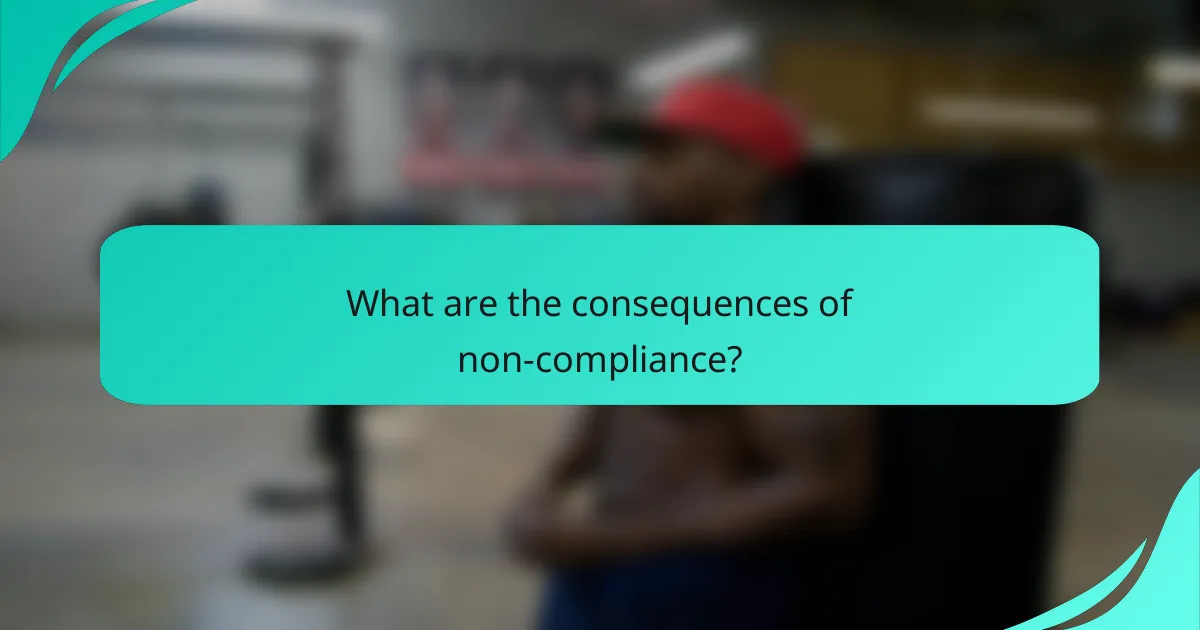
What are the consequences of non-compliance?
Non-compliance in sponsorship agreements can lead to significant repercussions, including legal penalties and reputational damage. Organizations must understand these consequences to ensure adherence to ethical standards and regulations.
Legal penalties and fines
Legal penalties for non-compliance can vary widely depending on the jurisdiction and the nature of the violation. Organizations may face fines that range from hundreds to millions of dollars, depending on the severity of the breach and applicable laws.
In some cases, non-compliance can result in contract termination or disqualification from future sponsorship opportunities. It is crucial for companies to stay informed about relevant regulations to avoid these costly outcomes.
Damage to reputation
Reputation damage from non-compliance can be long-lasting and detrimental to an organization’s brand. Negative publicity can arise from legal actions or public backlash, leading to a loss of trust among consumers and stakeholders.
To mitigate reputational risks, organizations should proactively communicate their commitment to ethical standards and compliance. Regular audits and transparent reporting can help maintain a positive public image and foster trust with partners and customers.
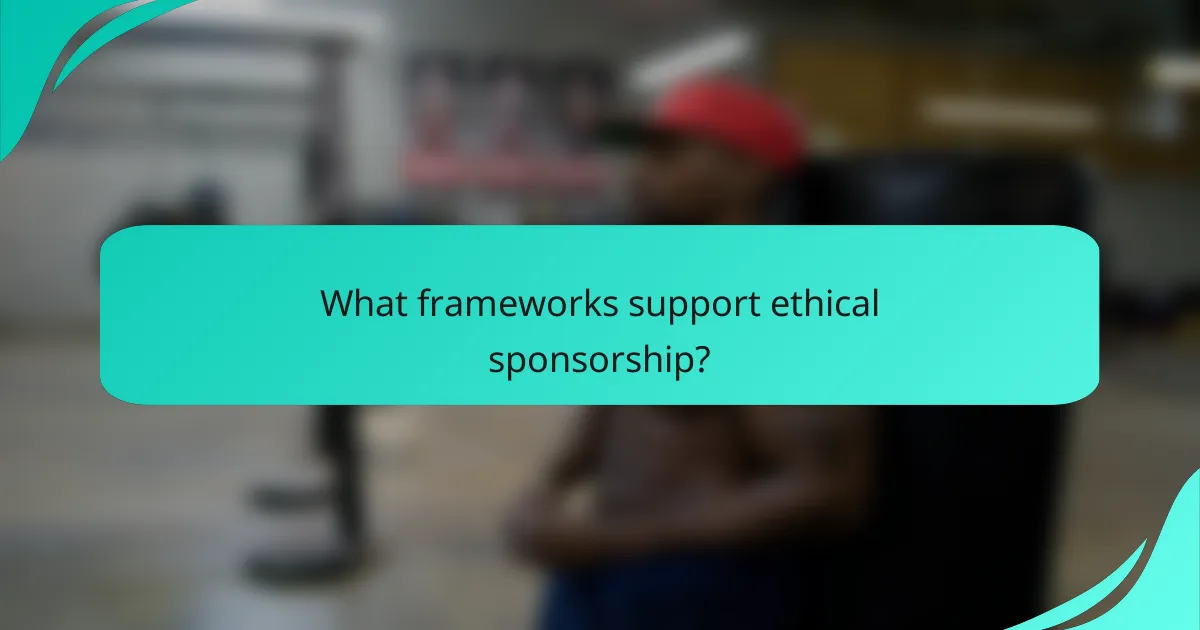
What frameworks support ethical sponsorship?
Ethical sponsorship is guided by various frameworks that ensure compliance with legal and moral standards. These frameworks help organizations navigate the complexities of sponsorship agreements while promoting transparency and integrity.
International Sponsorship Guidelines
International sponsorship guidelines provide a framework for ethical practices across borders. Organizations like the International Olympic Committee (IOC) and FIFA have established principles that govern sponsorships, emphasizing fairness, transparency, and respect for local laws.
When engaging in international sponsorship, it is crucial to understand the specific regulations of each country involved. For instance, sponsorship agreements in the European Union must comply with the General Data Protection Regulation (GDPR), which impacts how sponsors can collect and use personal data.
Industry-specific ethical codes
Many industries have developed their own ethical codes to guide sponsorship practices. For example, the American Medical Association (AMA) has specific guidelines for sponsorship in healthcare, focusing on the importance of patient welfare and avoiding conflicts of interest.
Adhering to these industry-specific codes can help organizations maintain credibility and trust. A practical step is to regularly review these codes and ensure that all sponsorship agreements align with them, avoiding potential pitfalls such as misrepresentation or undue influence.
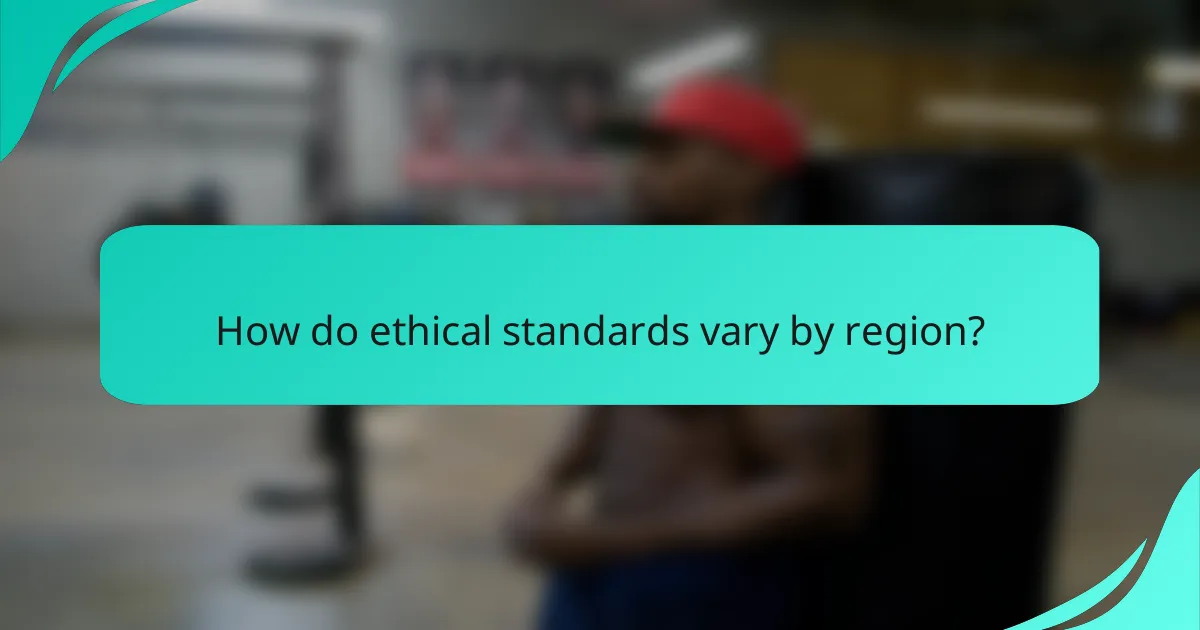
How do ethical standards vary by region?
Ethical standards in sponsorship agreements differ significantly across regions due to cultural, legal, and regulatory factors. Understanding these variations is crucial for organizations to ensure compliance and maintain integrity in their sponsorship practices.
Differences in US and EU regulations
In the United States, sponsorship agreements are primarily governed by federal and state laws, which focus on transparency and disclosure. The Federal Trade Commission (FTC) emphasizes the need for clear communication regarding sponsorships, particularly in advertising. In contrast, the European Union has stricter regulations, such as the General Data Protection Regulation (GDPR), which impacts how sponsors can collect and use personal data.
Companies operating in both regions must navigate these differences carefully. For instance, while US regulations may allow for more leniency in promotional tactics, EU regulations often require explicit consent from individuals before their data can be used. This can affect how sponsorship campaigns are structured and executed.
Regional cultural influences on sponsorship
Cultural attitudes towards sponsorship can greatly influence ethical standards. In some regions, sponsorship is viewed as a form of partnership that should reflect shared values, while in others, it may be seen as purely transactional. For example, in the US, sponsorships often emphasize brand visibility and consumer engagement, whereas in many European countries, there is a stronger focus on community impact and social responsibility.
Organizations should consider these cultural nuances when developing sponsorship strategies. Engaging local stakeholders and understanding community expectations can enhance the effectiveness of sponsorship efforts and foster positive relationships. Failing to align with regional values may lead to backlash or reputational damage.

What are best practices for drafting sponsorship agreements?
Best practices for drafting sponsorship agreements include ensuring clarity in terms and conditions, as well as incorporating ethical compliance clauses. These elements help protect all parties involved and promote transparency in the sponsorship relationship.
Clear terms and conditions
Clear terms and conditions are essential in sponsorship agreements to avoid misunderstandings and disputes. This includes specifying the rights and obligations of each party, the duration of the sponsorship, and the financial arrangements, such as payment schedules and amounts.
Consider including a detailed description of the deliverables expected from both the sponsor and the sponsored party. For example, if a sponsor is providing funding, outline how the funds will be used and what promotional activities will be undertaken in return.
Inclusion of ethical compliance clauses
Incorporating ethical compliance clauses in sponsorship agreements ensures that both parties adhere to relevant laws and ethical standards. This may involve stipulations regarding advertising practices, conflict of interest, and adherence to industry regulations.
For instance, a clause might require the sponsor to avoid promoting products that conflict with the values of the sponsored entity. This helps maintain the integrity of both parties and fosters a positive public image.

What emerging trends affect sponsorship ethics?
Emerging trends in sponsorship ethics are increasingly shaped by heightened scrutiny from stakeholders, evolving consumer expectations, and advancements in technology. Organizations must adapt to these changes to maintain ethical standards and ensure compliance in their sponsorship agreements.
Increased scrutiny from stakeholders
Stakeholders, including consumers, investors, and regulatory bodies, are paying closer attention to sponsorship agreements. This scrutiny often stems from a growing demand for transparency and accountability in business practices.
Organizations should proactively communicate their sponsorship strategies and the ethical considerations behind them. This can involve disclosing the criteria for selecting sponsors and the expected outcomes of the partnership.
To navigate this scrutiny effectively, companies should establish clear guidelines for ethical sponsorships. Regular audits and stakeholder feedback can help identify potential issues and enhance compliance with ethical standards.
